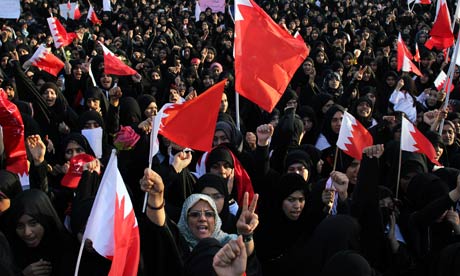The government of Bahrain is putting intense pressure on the families of students in Britain who were photographed attending a peaceful protest in Manchester in solidarity with the country's pro-democracy movement.
The gulf kingdom has stripped government-funded scholarships from those who attended the event outside the BBC building last month, the students say, and told parents to order their children home.
Students involved have told the Guardian they have "strong and well-founded" fears that they and their families could suffer beatings and torture as a result of the Bahrain government's crackdown on the protest 3,000 miles away and that they are likely to be arrested on their return.
"My mother was crying when she called me," said Rashad, whose attendance at the protest was his first such political action. "She said they are going to arrest you and that scared me. I told her I didn't do anything wrong but she said she was worried about my safety. They said I should come back to Bahrain, but we can't go back home. We will be arrested and disappeared. It has happened to others and I fear we are going to be tortured. We want the British government to protect us."
The students, who used pseudonyms to protect their families, said at least nine people studying in Manchester, Huddersfield, Newcastle, Reading and London had seen their £850 a month subsistence grants removed and had been told their tuition payments would be axed. Some said they had been made homeless as a result of the cuts and were considering requesting asylum in the UK when their student visas expire.
Sulieman, another student who said his scholarship had been revoked, said the ministry of education in Bahrain called his father to order him home a couple of days after the protest, in a pattern repeated for many of the protesters. "My father asked how they knew I was there and they said they had video footage and pictures," he said. "They told him I must come back, but I am not going back."
The students believe some of the images were taken by Bahraini or Saudi "spies" alerted to the event on Facebook. The demonstration was disrupted by interventions from supporters of the regime and some people whom protesters identified as being from Saudi Arabia.
Some of the families have also received visits from the Bahraini authorities, according to Amin Elwassila, an Arab activist in Manchester who is supporting the group.
"It seems very strange that every time something happens here in Britain there is a repercussion there," he said. "Some of them started receiving phone calls from their families telling them that the Bahrain government had contacted them telling them they will be removing their scholarships and that on their return to Bahrain the students will be questioned by the authorities. They were all very frightened. Some of the families were receiving regular visits. Not all families of Bahraini students were contacted, just those who had been on the demonstration."
The Bahraini embassy in London declined to comment on the claims of government's sanctions against students and forwarded inquiries about the withdrawal of scholarships to the cultural attache, who did not return calls.
On Friday night a further solidarity protest was scheduled at the same location, but all of the Bahraini students the Guardian spoke to said they were too afraid to go.
The sanctions against the students come amid increasing international concern at Bahrain's treatment of dissenters. The British government has raised with Bahrain's interior minister the deaths of four dissidents in the last week, three of whom were in police custody.
Next Thursday, Catherine Ashton, the EU's high representative for foreign affairs, will travel to Bahrain after calling for the immediate release of all those detained for expressing themselves.
Zainab al-Khawaja, a 27-year-old mother, will on Saturday enter the sixth day of a hunger strike in protest at the arrest and beating of her father, the human rights activist, Abdulhadi al-Khawaja, and her husband and brother-in-law. Her US-based sister, Maryam al-Khawaja, said she was now very weak and dizzy and her family want her to go to hospital. She is resisting partly because the hospitals are said to be in the control of Bahrain's military.

No comments:
Post a Comment